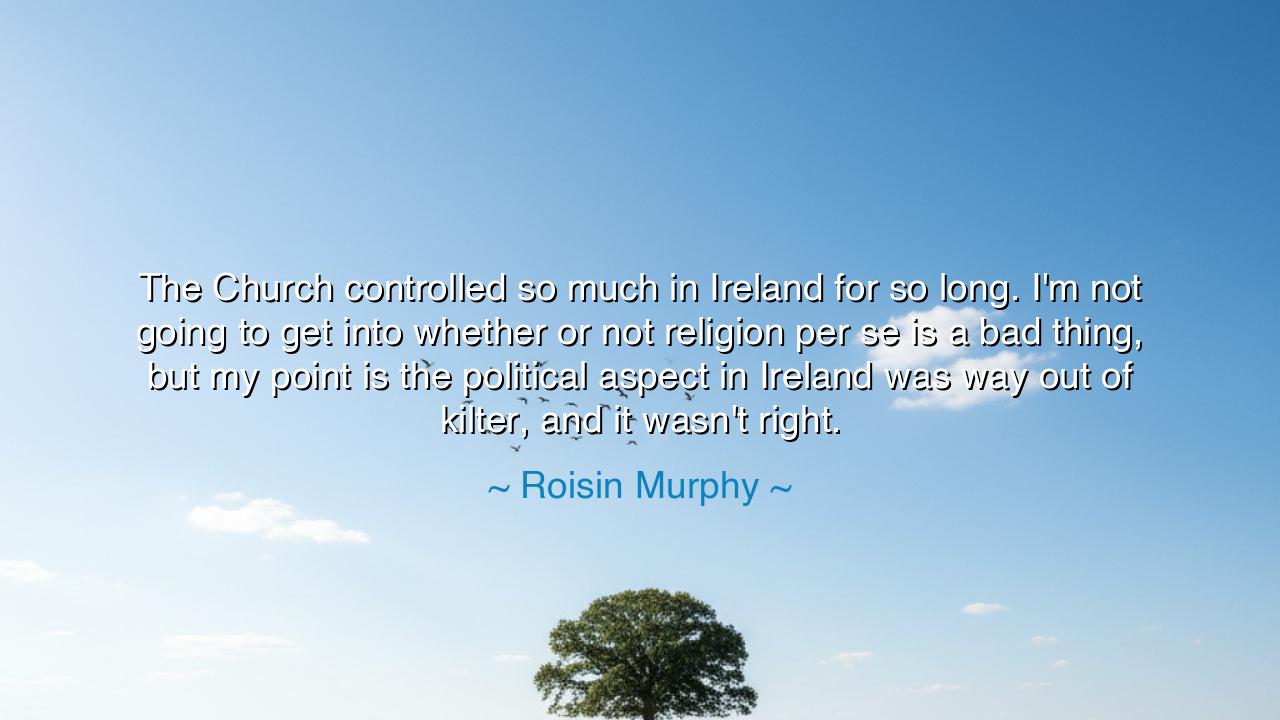
The Church controlled so much in Ireland for so long. I'm not
The Church controlled so much in Ireland for so long. I'm not going to get into whether or not religion per se is a bad thing, but my point is the political aspect in Ireland was way out of kilter, and it wasn't right.






Hearken, O children of the ages, to the words of Roisin Murphy, whose voice, though clothed in the garb of music, carries the weight of history: “The Church controlled so much in Ireland for so long. I'm not going to get into whether or not religion per se is a bad thing, but my point is the political aspect in Ireland was way out of kilter, and it wasn't right.” These are not idle words; they are the cry of a people who bore centuries under a yoke where faith was not only a personal devotion but a political power. She speaks not against the soul’s search for the divine, but against the imbalance that arises when spiritual authority becomes entwined with the governance of nations.
For it is an ancient danger that when religion and politics are fused, justice falters and freedom bends. Faith, in its purest form, seeks to lift the heart, to console the weary, to give meaning to the mysteries of life. Politics, by contrast, is the art of organizing men, of crafting laws, of balancing power. When the two are joined without restraint, faith becomes a weapon and politics a servant of dogma. Ireland, for long centuries, felt this imbalance, when the voice of the Church did not merely guide souls but dictated the laws of schools, families, and even the most private decisions of life.
Consider the story of the Magdalene Laundries, institutions run by religious orders, where women deemed “fallen” or “unfit” were confined for decades. Cloaked in the language of morality, these places stripped countless souls of dignity, forcing labor upon them, cutting them off from the world. Here we see what Murphy calls “out of kilter”: the blending of moral authority with political permission, allowing injustice to masquerade as virtue. The faith that should have comforted instead became a chain, and the politics that should have protected became silent.
And yet, this tale is not of Ireland alone. Throughout history, wherever spiritual power and political rule grew too tightly bound, oppression followed. In medieval Europe, kings ruled by divine right, silencing dissent as heresy. In other lands, prophets’ words became laws enforced by sword. Always the pattern is the same: when no boundary stands, those who question are branded traitors not only to the state but to God Himself. Thus, the cry of Murphy is the cry of all ages: that balance must be restored, and no earthly power should clothe itself in the garments of the eternal.
But mark well: Murphy does not condemn religion itself. She speaks carefully, knowing that belief, in its essence, need not be the enemy. She separates the pure flame of faith from the heavy chains of politics. For belief may still inspire art, community, and love; it is when it is wielded as an instrument of control that it corrupts both throne and altar alike. This distinction is the wisdom of her words: that what is wrong is not belief, but imbalance.
From her lesson flows a charge to us, the heirs of the future: we must guard the sacred boundary between the soul and the state. In our own lands, in our own communities, we must be vigilant when leaders drape themselves in religious authority, for often they do so not to serve heaven, but to secure earthly dominion. We must ask always: does this law serve justice, or does it serve dogma? Does it protect the people, or only a creed?
Therefore, let each of us act. Learn the history of your people, so that past mistakes are not repeated. Support the freedom of both religion and politics, but do not allow one to enslave the other. When you hear a voice of power cloaked in sanctity, question it with courage. And when you practice your faith, let it be the kind that uplifts and heals, never the kind that binds or condemns.
So let this truth be passed down: balance is the guardian of freedom. Roisin Murphy’s words remind us that when faith and politics are “out of kilter,” injustice is born. But when each remains in its rightful place—faith in the soul, politics in the polis—then both may flourish without corruption. Stand, then, as guardians of that balance, and let neither crown nor cross outweigh the dignity of the human spirit.






AAdministratorAdministrator
Welcome, honored guests. Please leave a comment, we will respond soon